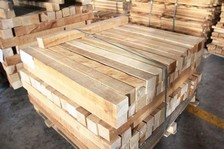Rubber hardwood is becoming increasingly popular in the world of sustainable and durable flooring solutions. Known for its unique combination of durability, eco-friendliness, and aesthetic appeal, rubber hardwood is an excellent choice for both residential and commercial settings. In this comprehensive guide, we will explore everything you need to know about rubber hardwood, including its benefits, applications, maintenance, and why it might be the perfect flooring option for your needs.
What is Rubber Hardwood?
Rubber hardwood is a hybrid flooring material that combines the natural properties of rubber with the traditional appeal of hardwood. It is created by layering a veneer of natural hardwood over a base made of high-density rubber. This innovative design allows rubber hardwood to offer the best of both worlds: the luxurious look of hardwood and the resilience and comfort of rubber.
Benefits of Rubber Hardwood
1. Durability and Longevity
One of the most significant advantages of rubber hardwood is its durability. The rubber base provides a strong foundation that resists wear and tear, making it ideal for high-traffic areas. Unlike traditional hardwood, which can dent or scratch easily, rubber hardwood is more resistant to physical damage. This resilience ensures that your flooring will maintain its beauty and functionality for years to come.
2. Eco-Friendly Option
Rubber hardwood is an eco-friendly flooring solution. The rubber used in the base layer is often made from recycled materials, reducing waste and promoting sustainability. Additionally, by using a veneer of hardwood rather than solid planks, fewer trees are required, making it a more environmentally responsible choice.
3. Comfort and Noise Reduction
Another benefit of rubber hardwood is the comfort it provides underfoot. The rubber base offers a slight give, making it more comfortable to walk or stand on for extended periods. This feature is particularly beneficial in settings where people are on their feet all day, such as in kitchens or retail environments. Furthermore, rubber hardwood helps in noise reduction. The rubber base absorbs sound, making it quieter than traditional hardwood flooring.
4. Moisture Resistance
Unlike traditional hardwood, rubber hardwood is highly moisture-resistant. This quality makes it suitable for use in areas prone to moisture, such as bathrooms, basements, and kitchens. The rubber base acts as a barrier, preventing water from penetrating the flooring and causing damage. This moisture resistance also makes rubber hardwood easier to clean and maintain.
5. Aesthetic Appeal
Rubber hardwood offers the aesthetic appeal of traditional hardwood without the associated drawbacks. It comes in a variety of finishes, allowing you to choose a style that complements your interior design. Whether you prefer the classic look of oak or the modern appeal of maple, rubber hardwood can provide the visual impact you’re looking for.
Applications of Rubber Hardwood
Rubber hardwood is versatile and can be used in a variety of settings. Some of the most common applications include:
- Residential Spaces: Rubber hardwood is an excellent choice for living rooms, bedrooms, and kitchens. Its durability and comfort make it ideal for family homes, while its moisture resistance ensures longevity in areas where spills are common.
- Commercial Spaces: In commercial settings, such as offices, retail stores, and restaurants, rubber hardwood’s durability and noise reduction properties make it a practical choice. It can withstand heavy foot traffic while maintaining its appearance and functionality.
- Healthcare Facilities: Rubber hardwood is also popular in healthcare facilities due to its comfort and moisture resistance. It provides a safe and comfortable surface for patients and staff, and its easy maintenance makes it suitable for environments that require high standards of cleanliness.
Maintenance Tips for Rubber Hardwood
Maintaining rubber hardwood is relatively simple, but there are a few key practices to keep in mind to ensure its longevity:
1. Regular Cleaning
To keep your rubber hardwood looking its best, it’s essential to clean it regularly. Use a soft broom or vacuum with a hardwood floor attachment to remove dirt and debris. For deeper cleaning, a damp mop with a mild, pH-neutral cleaner is recommended. Avoid using harsh chemicals or abrasive cleaning tools, as they can damage the hardwood veneer.
2. Protecting the Surface
While rubber hardwood is more resistant to scratches than traditional hardwood, it’s still essential to protect the surface. Place felt pads under furniture legs to prevent scratches when moving items. Additionally, using area rugs in high-traffic areas can help reduce wear and tear on the flooring.
3. Addressing Spills and Stains
Thanks to its moisture resistance, spills on rubber hardwood are less likely to cause damage. However, it’s still a good idea to clean up spills promptly to prevent any potential staining. Use a soft cloth to blot the spill and avoid rubbing, which can spread the liquid and potentially damage the hardwood veneer.
4. Periodic Refinishing
Over time, the hardwood veneer of rubber hardwood may show signs of wear. In such cases, refinishing may be necessary to restore its appearance. Refinishing involves sanding down the surface and applying a new coat of finish. This process can help extend the life of your flooring and keep it looking fresh.
Why Choose Rubber Hardwood Over Traditional Hardwood?
Rubber hardwood offers several advantages over traditional hardwood, making it a superior choice in many situations. Its durability, moisture resistance, and eco-friendliness are key factors that set it apart. Additionally, the comfort and noise reduction benefits make it a more practical option for both residential and commercial settings.
Conclusion
Rubber hardwood is a revolutionary flooring material that combines the beauty of hardwood with the practical benefits of rubber. Its durability, eco-friendliness, comfort, and moisture resistance make it an ideal choice for a wide range of applications. Whether you’re renovating your home or outfitting a commercial space, rubber hardwood is a flooring solution that offers the best of both worlds.

